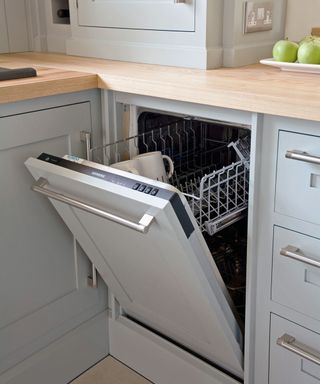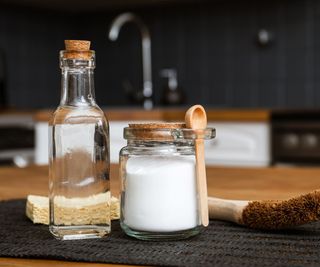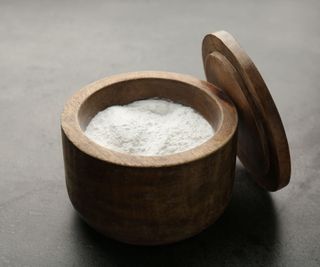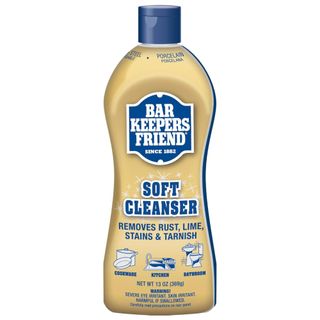At the end of a long day, we’re all, at least sometimes, guilty of loading every plate, pot and piece of cutlery into the dishwasher – it’s quick, convenient and it gets the job done.
But, can stainless steel go in the dishwasher? While experts say it can, it’s important to proceed with caution, to keep pots shiny and knives sharp.
Here, we spoke to cleaning professionals for their cleaning tips on putting stainless steel in the dishwasher, to find out whether they recommend doing so, and how they suggest washing it instead.
Can stainless steel go in the dishwasher?

(Image credit: Future PLC)
The short answer is yes, stainless steel is indeed dishwasher safe. But, Forrest Webber, owner of Bear Brothers Cleaning and The Trade Table throws down a key caveat. Forrest says, ‘Despite being dishwasher safe, the high heat and harsh detergents may cause water stains, discoloration, and dullness on stainless steel cutlery.’
If you’re unsure what you cannot put in the dishwasher, the simplest way to determine it item by item is by checking the manufacturer’s guidance. For example, a stainless steel appliance with other coatings or materials may not be dishwasher safe.
Ken Doty, COO of The Maids explains, ‘The only time you shouldn’t wash a stainless steel appliance is when there are other non-stainless steel materials such as aluminium, which can degrade after repeated washes unless protected with a coating or finish. Any stainless steel utensils with wood or plastic may not be dishwasher friendly as well.’
Doty points out that the rust-resistant surface on high-quality stainless steel may also be affected by dish-washing, highlighting the importance of always checking for the dishwasher safe care instruction. ‘Some stainless steel water bottles that are painted or insulated might not be suitable for dishwashers,’ he continues.
If you are washing your stainless steel in the dishwasher, make sure there are no leftover food scraps, or you may find yourself trying to unclog a dishwasher, and make sure your pots and pans are stacked dirty side down, recommends Doty.
And, if you’re wondering if you can put non-stick pans in the dishwasher, the short answer is no, regardless of whether they’re made of stainless steel or not. Carolina Kazimierski, co-owner and president of Sophia’s Cleaning Service, says, ‘In general, I’ve had no problems or damage from running stainless steel through the dishwasher, but cases where it isn’t dishwasher safe tend to be where it has a non-stick coating.’
Instead, considering any mistakes to avoid when cleaning kitchenware, non-stick pans should be washed using warm, soapy water, with a dish soap such as Dawn Ultra Dish Soap Dishwashing Liquid available at Walmart, and a non-abrasive sponge, such as the Scrub-it Multi-Purpose Sponges available at Amazon.
Punteha van Terheyden, head of Solved at H&G adds, ‘When I have finished cooking with my non stick pans, I usually run them under a hot tap to get off any loose debris, then squirt some dish soap and hot water into the pan and leave on the stovetop, at the back, on a cool spot, to soak.
‘Though they are said to be non-stick, sometimes you might find stubborn grease or debris need a little elbow grease to shift. I do this before I sit down and eat, which means by the time the meal is over, the pan is cool enough to clean without burning myself, and any the dish soap has done it’s magic on stubborn grime.’
Alternative ways to clean stainless steel

(Image credit: Farrow & Ball)
As cleaning expert Webber says, ‘Choosing something gentler is sometimes a better option.’ So, what do the pros recommend?
1. Handwash

(Image credit: Getty Images)
Much like washing non-stick pans, cleaning expert Doty recommend hand-washing stainless steel cutlery and pans, using expert tips for washing dishes.
He says, ‘Hand-washing your stainless steel kitchen tools is the most effective method aside from using your dishwasher. This can allow you to target the harder to clean areas that may have stubborn food or burn marks, and prevent any damage to the protective coating from chemically heavy detergent.
‘Wait until the utensil has completely cooled off and soak in soapy water to help lift the grease and grime.’
For a gentle yet effective clean, we recommend the bestselling Method Dish Soap available at Walmart, which is made with powerful, plant-based ingredients to cut grease and grime with a cruelty-free formula.
2. Clean with vinegar

(Image credit: Getty Images)
Did you know you can clean stainless steel pans with vinegar? Cleaning expert Webber explains, ‘Try spraying your stainless steel with white vinegar if it has turned into a fingerprint magnet. After using a microfiber cloth (such as the bestselling HOMEXCEL Microfiber Cleaning Cloth available at Amazon) to clean it, your stainless steel will be shiny and streak-free.’
Vinegar is also an effective way to clean a burnt pot, as it contains acetic acid, and we recommend the Great Value Distilled White Vinegar available at Walmart, which is distilled to a 5% acidity.
3. Clean with baking soda

(Image credit: Alamy)
You can also clean stainless steel pans and cutlery with baking soda, such as the ARM & HAMMER Baking Soda available at Amazon, which works as a mild abrasive to lift grease and grime.
Cleaning expert Webber says, ‘Got some burnt-on mess that’s clinging on for dear life? Whip up a baking soda paste with water, and gently scrub it.
‘Think of it as a natural exfoliant for your pan. The baking soda will break down the gunk without scratching the surface,’ and offer a much more effective clean than putting it in the dishwasher.
4. Use Bar Keepers Friend
Described by cleaning expert Webber as the ‘fairy godmother of stainless steel,’ Bar Keepers Friend is a great alternative to putting stainless steel in the dishwasher.
He says, ‘Just a sprinkle, and a gentle scrub and your cookware looks brand new. It’s tough on grime but gentle on shine.’
There are also many other things you can clean with Bar Keepers Friend, so it’s a great product to keep on-hand – it’s one of the essential products everyone needs in their ultimate cleaning supplies line-up.
 Amazon’s choice
Amazon’s choice
Bar Keepers Friend Soft Cleanser
This pre-mixed formula removes grease, grime and stubborn stains, and is suitable for use all around the home. From polishing porcelain to buffing brass, it’s a versatile solution that cleans away without leaving any film or residue behind.
All prices were correct at the time of publication.
FAQs
What metal cannot go in the dishwasher?
Along with non-stick pans, cast iron, enameled cast iron, and aluminium should never be put in the dishwasher.
Instead, to clean cast iron or to clean a cast iron skillet, simply use warm, not hot, soapy water.
Have you tried polishing your stainless steel appliances with olive oil?
As bizarre as it might sound, this genuinely works, and can make your old appliances look good as new.
After a long day, it’s tempting to load all your dishes into the dishwasher for a quick and convenient clean. But can stainless steel go in the dishwasher? While experts say it’s safe, it’s important to be cautious to maintain the quality of your pots and knives.
We spoke to cleaning professionals for their tips on cleaning stainless steel in the dishwasher and whether it’s recommended. Here’s what they had to say:
Can stainless steel go in the dishwasher?

(Image credit: Future PLC)
Yes, stainless steel is dishwasher safe. However, Forrest Webber, owner of Bear Brothers Cleaning and The Trade Table, advises caution. He warns that the high heat and harsh detergents in dishwashers can cause water stains, discoloration, and dullness on stainless steel cutlery.
It’s important to check the manufacturer’s guidance for each item to ensure it is dishwasher safe. Items with other coatings or materials may not be suitable for the dishwasher.
Ken Doty, COO of The Maids, explains that stainless steel appliances with non-stainless steel materials, such as aluminum, should not be washed in the dishwasher. Additionally, utensils with wood or plastic components may not be dishwasher friendly.
If you do choose to wash stainless steel in the dishwasher, make sure to remove any food scraps and stack pots and pans dirty side down to prevent damage.
Non-stick pans, whether made of stainless steel or not, should not be put in the dishwasher. Instead, they should be hand washed with warm, soapy water and a non-abrasive sponge.
For stubborn grease or debris on non-stick pans, Punteha van Terheyden, head of Solved at H&G, suggests soaking them in hot soapy water before cleaning.
Alternative ways to clean stainless steel

(Image credit: Farrow & Ball)
Cleaning expert Webber recommends gentler cleaning methods for stainless steel. Here are some tips from the pros:
1. Handwash

(Image credit: Getty Images)
Doty recommends hand-washing stainless steel items to target tough areas and prevent damage from harsh detergents. Use warm soapy water and a gentle scrubbing method for effective cleaning.
For a gentle clean, try Method Dish Soap for cutting grease and grime without harsh chemicals.
2. Clean with vinegar

(Image credit: Getty Images)
Cleaning expert Webber suggests using white vinegar to clean stainless steel and remove fingerprints. Follow up with a microfiber cloth for a streak-free shine.
Vinegar can also be used to clean burnt pots due to its acetic acid content.
3. Clean with baking soda

(Image credit: Alamy)
Baking soda can be used as a mild abrasive to clean stainless steel pans and cutlery. Create a paste with water and gently scrub away burnt-on messes for a sparkling finish.
4. Use Bar Keepers Friend
Cleaning expert Webber recommends using Bar Keepers Friend as a gentle yet effective cleaner for stainless steel. This versatile product can remove grime and stains without damaging the surface.
Consider using Bar Keepers Friend for other cleaning tasks as well, as it is a versatile solution for various household cleaning needs.
 Amazon’s choice
Amazon’s choice
Bar Keepers Friend Soft Cleanser
This pre-mixed formula removes grease, grime and stubborn stains, and is suitable for use all around the home. From polishing porcelain to buffing brass, it’s a versatile solution that cleans away without leaving any film or residue behind.
All prices were correct at the time of publication.
FAQs
What metal cannot go in the dishwasher?
In addition to non-stick pans, avoid putting cast iron, enameled cast iron, and aluminum in the dishwasher. Clean these items by hand with warm, soapy water instead.
Have you tried polishing stainless steel appliances with olive oil? This method can give old appliances a fresh look.
